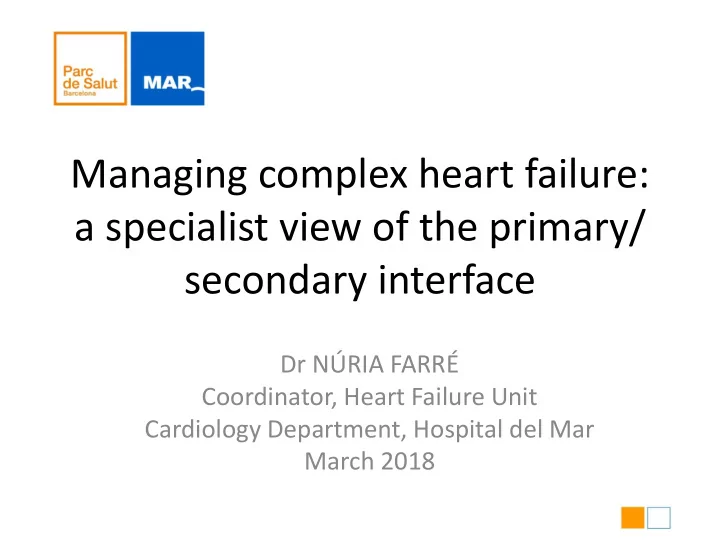

Managing complex heart failure: a specialist view of the primary/ secondary interface Dr NÚRIA FARRÉ Coordinator, Heart Failure Unit Cardiology Department, Hospital del Mar March 2018
Is HF a problem? • Prevalence • Prognosis • Resource use
1. HEART FAILURE PREVALENCE
Incidence: 4.2% incident HF Prevalence: 1,1% population level: - 0,3% 45-54 years - 0,9% 55-64 years - 2,5% 65-74 years - 8,8% > 75 years Koudstaal S et al. Eur J Heart Fail. 2017;19(9):1119-1127. Farré et al. PLoS One. 2017;12(2):e0172745
Envelliment de la població 1956 2006 2050 Christensen et al. Lancet, 2009; 374(9696): 1196 – 1208
HFpEF/ HFrEF/ HFmrEF 88,195 HF patients Farré et al. PLoS One. 2017 Feb 24;12(2):e0172745
2. PROGNOSIS
Farré et al. PLoS One. 2017 Feb 24;12(2):e0172745
Farré et al. PLoS One. 2017 Feb 24;12(2):e0172745
3. RESOURCE USE
• 1-2% of healthcare budget • 2/3 due to hospitalization » HF RESOURCE USE » ? RESOURCE USE OF PATIENT WITH HF
- €536,2 M was spent in 2013 in the care of HF patients - 7,1% of healthcare budget - Average expenditure of €6571 per patient/year Farré N et al. Eur J Heart Fail. 2016;18(9):1132-40
Farré N et al. Eur J Heart Fail. 2016;18(9):1132-40
- Prevalence of HF increases with age - Bad prognosis - Intensive resource use (hospitalization, pharmacy, primary care)
WHO LOOKS AFTER HF PATIENTS?
• Hospital: Cardiology, Internal Medicine, Geriatrics, Emergency room, Palliative care • Primary care: General practitioners, case managers, nurses • Skilled nursing centers • Pharmacies • Social workers…
IS IT IMPORTANT TO COORDINATE CARE?
• 2.1 million inhabitants of England, 89 554 patients with newly recorded HF: – 23 547 (26%) were recorded in PC but never hospitalized – 30 629 (34%) in hospital admissions but not known in PC – 23 681 (27%) in both highest prescription ACEI, BB, MRA – 11 697 (13%) in death certificates only. Koudstaal S et al. Eur J Heart Fail. 2017;19(9):1119-1127.
33.1% of death occurred within 3 months Koudstaal S et al. Eur J Heart Fail. 2017;19(9):1119-1127.
Working alone is not an option Transitions
- 53 randomized studies - 12.356 patients - 58% male - Age 57-85 (approx. 70-75) - 19 studies no LVEF available - 35 studies LVEF <40%
TYPE OF INTERVENTION • Education • Pharmacist intervention • Telemonitoring • Telephone • Home visits (nurse) • Nurse case manager: home visit + phone • Disease Managment Clinic (Multidisciplinary team (hospital)
HR 0.92 (0.86-0.97), p=0.005 HR 0.71 (0.66-0.76), p<0.001 HR 0.86 (0.80-0.94), p<0.001
p<0.001 p=0.085 p=0.123 P<0.001 p=0.008 p=0.001
Higher risk re-hospitalization the first 30-90 days after discharge Close follow-up can decrease hospitalization Not all patients can come to the hospital frequently Logistic limitations (space and professionals) How can we improve results?
TELEMEDICINE
J Telemed Telecare. 2016 Jul;22(5):282-95. Single-center prospective randomized open blinded
Biometric monitoring Symptoms reporting (heart rate, blood (7 questions) pressure, weight) Daily Warning alarms Bleutooth and 3G technology Telefonica Soluciones, S.A.
CONCLUSIONS • HF is frequent and associated with bad prognosis • Transitional care improves prognosis • It should be adapted to resources available in every area.
Recommend
More recommend